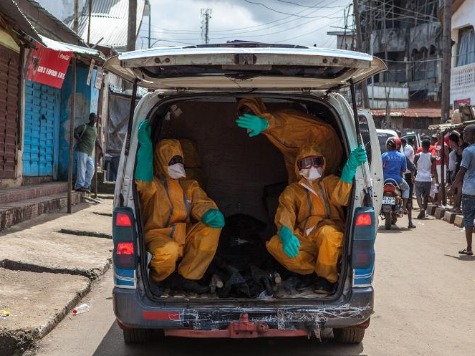The UN ‘Ebola Envoy’ has spoken out about the present situation in West Africa and has warned “the outbreak is continuing to expand rapidly”, and without further international support of personnel and equipment the virus is not going to be contained any time soon.
Speaking in an interview with Deutsche Welle, Dr David Nabarro, an expert on pandemics and formerly of the World Health Organisation said although some “impact” was starting to become evident in West Africa, there was still much to be done and the crisis was not going to be under control until next year. Despite the comparatively wealthy country of Nigeria controlling it’s Ebola outbreak and eradicating the virus there, Dr Nabarro said “there are still parts of Liberia where the outbreak is advancing rapidly, and the same with Guinea and Sierra Leone”.
The parts Dr. Nabarro refers to are the rural areas, which make up most of these West African nations. In former British colony Sierra Leone, the rate of infection is rapidly accelerating, and is now spreading nine times faster than two months ago, according to the African Governance Initiative. Up until this week, the virus has mostly been observed travelling with a flow of people moving westwards from rural areas to capital and surrounding areas of Freetown. Now it has been reported the until recently Ebola-free self quarantined north of the country is suffering its first outbreak, with dozens killed already.
Nabarro also identified key areas which the international community had to work together to bring the crisis to an end, areas which international aid organisation Medecins Sans Frontieres (Doctors Without Borders) claims contain “critical gaps”. The areas where the international community needed to pull together, he said, included such basic fundamentals as being able to monitor those who have been in close contact with Ebola patients, and hygienic burial practices. Only when things like basic levels of care in treatment centres are implemented for preventable deaths and public disinformation on how the disease spreads is dispelled will the rate of infection and mortality fall.
The preconditions for this have not been met, however. Dr Nabarro said: “For that to happen, we need a lot of international and national personnel, well trained, with the additional feature that everyone who is working is able to keep themselves safe – with the right training, the right equipment, and the right support”.
There have now been very nearly 5,000 deaths from this outbreak, and over 13,500 reported cases. The British government, through it’s international aid agency DfID has deployed a field hospital to former colony Sierra Leone, which has been unpacked from auxiliary ship RFA Argus and will begin operating soon, bringing another 600 beds to the country. The hospital has been constructed by British Army engineers, and local labour and will be staffed and equipped by NHS staff, Army Medics, and British charity aid workers.

COMMENTS
Please let us know if you're having issues with commenting.